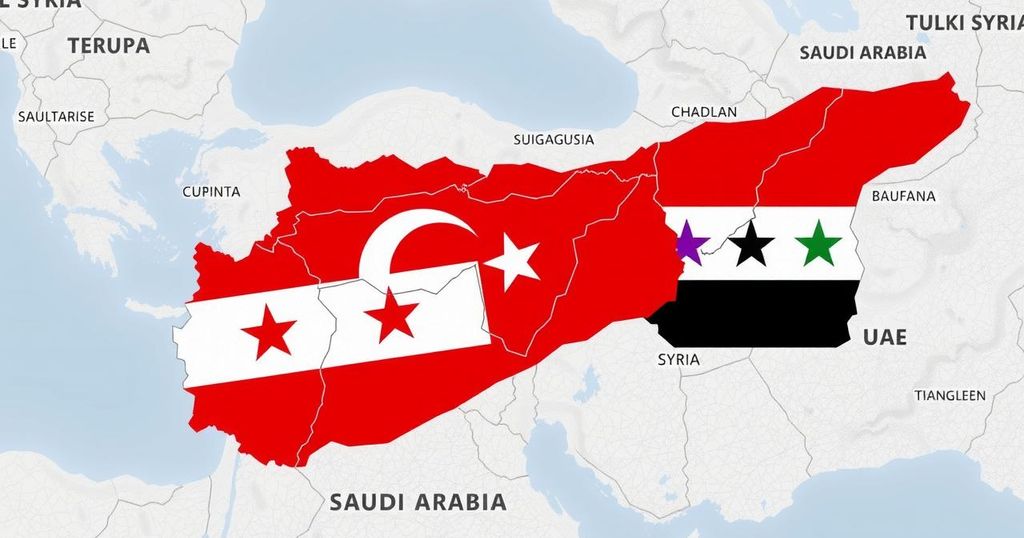Turkey pursues support from Saudi Arabia and UAE to reshape Syria’s future after Assad’s regime collapse. Turkish officials emphasize learning from Arab Spring mistakes and seek a stable, cooperative governance framework, recognizing the necessity for regional and international backing while addressing rising influences such as HTS. Diplomatic efforts aim to cultivate an inclusive political order in Syria free from external dominance, with reconstruction reliant on Gulf and Western financial support.
Turkey is actively seeking support from Saudi Arabia and the United Arab Emirates (UAE) to establish a new governance framework in post-Assad Syria. Following the swift downfall of Bashar al-Assad’s regime, Turkish officials exercise caution, aiming to learn from the disruptions witnessed during the Arab Spring. Turkish President Recep Tayyip Erdogan is particularly focused on engaging Gulf nations hesitant about Islamist movements, including the Muslim Brotherhood, to secure their prolonged involvement in shaping Syria’s future. He acknowledges the significance of their concerns and the need to integrate their insights into the new Syrian administration.
Erdogan’s forthcoming summit with Egyptian President Abdel Fattah el-Sisi in Cairo presents an opportunity for discussions on Syria’s governance given Sisi’s opposition to Islamist factions such as Hay’at Tahrir al-Sham (HTS). While Turkey denies direct support for HTS, Minister Hakan Fidan acknowledges Turkey’s nuanced understanding of the group. Additionally, Ankara has reportedly offered military and logistical assistance to HTS to enhance the stability of Syria.
Turkey’s diplomatic outreach follows a summit in Aqaba, Jordan, that included discussions with various international stakeholders advocating for an inclusive, non-sectarian Syrian government. Amid these complex negotiations, Turkey emphasizes the importance of a neutral Syria that does not threaten its neighbors or other regional actors, specifically calling for an end to Israeli air strikes targeting Syrian military positions.
The Turkish government maintains that neither Iranian nor Turkish dominance should influence Syria’s governance. Fidan emphasizes the need for cooperative regional relations among nations like Saudi Arabia, the UAE, and Qatar to avert external intervention and prolonged conflicts. These efforts seem to resonate as Gulf leaders shift their stance from supporting Assad’s return to the Arab League to potentially investing in a new Syrian economic framework.
Turkey recognizes that reconstruction efforts in Syria require substantial funding from Gulf nations and Western powers, and European officials have hinted at increased engagement in early recovery initiatives, including humanitarian relief efforts. However, Russia’s military presence in Syria poses significant challenges, with various EU member states insisting on Moscow’s withdrawal as a precondition for supporting a new administration.
Amid ongoing negotiations, Turkey hopes to persuade Russia and Iran to acknowledge the HTS-led government, thereby fostering a conducive environment for stability and recovery in Syria. Ultimately, Turkey’s intricate diplomacy aims to cultivate an equilibrium where Syria can coexist peacefully with its regional neighbors.
The article provides an insight into Turkey’s strategic positioning in the rapidly evolving political landscape of Syria following the decline of Bashar al-Assad’s regime. Turkey’s approach is marked by a careful assessment of past interventions, emphasizing the necessity of regional cooperation and international backing to avoid a repeat of the Arab Spring’s chaos. The dynamics between Turkey, Gulf nations, and external powers like Russia and the EU are critical in shaping the future governance and stability of Syria, a country marred by years of conflict.
In conclusion, Turkey is fostering alliances with Saudi Arabia and the UAE to influence the governance of a post-Assad Syria, underscoring the importance of regional cooperation while reaching out to various international stakeholders. While seeking a neutral Syria that poses no threat to its neighbors, Turkey aims to reshape the political order to prevent external domination and support reconstruction efforts. The active engagement with Gulf nations and remedial plans by European powers highlight the complexities involved in Syria’s recovery process, especially considering Russia’s significant military presence and influence in the region.
Original Source: www.middleeasteye.net






